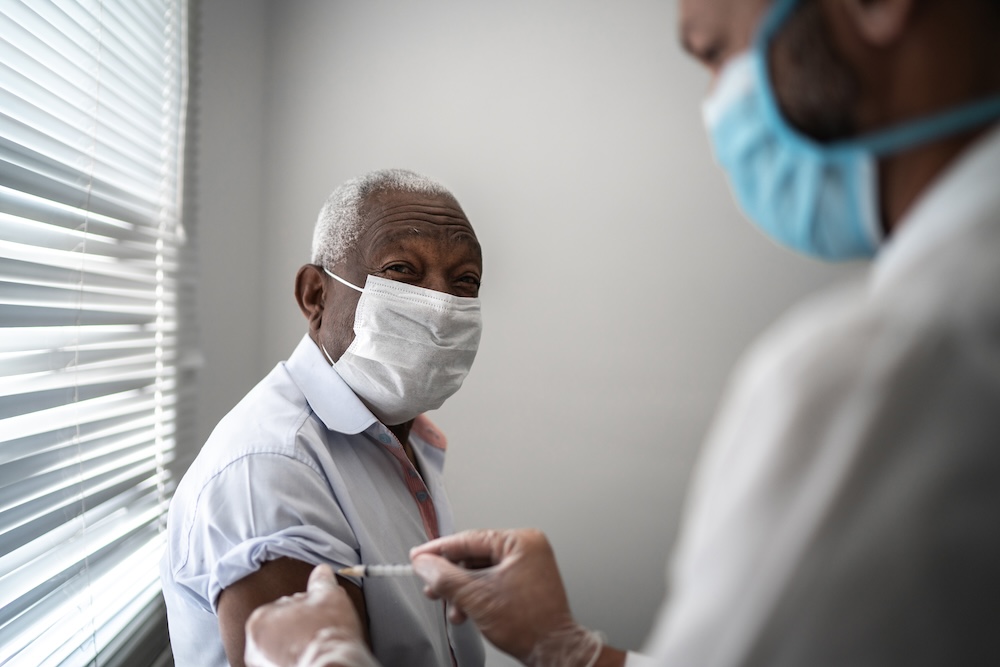Kaiser Permanente researchers show reduced COVID-19 hospitalizations among vaccinated cancer patients
People being treated for cancer were much less likely to get severe COVID-19 if they received booster vaccinations against it, according to a new study from Kaiser Permanente researchers.
“These findings are important for the field of oncology,” said lead author Jacek Skarbinski, MD, an infectious disease physician with The Permanente Medical Group and research scientist with the Kaiser Permanente Division of Research.

“Patients undergoing cancer treatment are often immunosuppressed and thus more vulnerable to infections,” Skarbinski explained. “However, they may also be less likely to have a robust immune response to vaccination. We found that COVID-19 booster vaccinations were very effective in preventing severe COVID-19 hospitalizations among our patients undergoing cancer treatment.”
The analysis, published in JAMA Oncology, looked at large groups of people being treated for cancer with chemotherapy or immunotherapy in 4 health systems during 2 different periods in 2022 and 2023. All received the initial primary series of COVID-19 vaccination.
Of the first group of 72,831 cancer patients studied, 69% received the monovalent COVID-19 booster, which was given before January 2022. This group was about 30% less likely to be hospitalized for COVID-19 disease than the cancer patients who did not get the booster.
In the second group of 88,417 cancer patients, who were studied later in the COVID-19 pandemic, 38% received the booster. During this time period — late 2022 through early 2023 — patients received the bivalent version of the COVID-19 booster, which was being given to protect against newer versions of the virus. This group was also 30% less likely to be hospitalized for COVID-19 than those who had not had the booster.
Skarbinski said this was the largest study of vaccine effectiveness for preventing COVID-19 hospitalizations among cancer patients in the U.S.
COVID-19 vaccination should be a part of routine cancer care and will reduce high-risk hospitalizations for these vulnerable patients.
—Jacek Skarbinski, MD
The analysis also showed how many patients with cancer would need to receive a COVID-19 booster to keep one such patient out of the hospital with severe COVID-19. In the first group 166 booster vaccinations were needed to prevent one hospitalization; in the second group 310 booster vaccinations would prevent one hospitalization.
“The number needed to vaccinate to prevent one hospitalization were very favorable in our study,” Skarbinski said. “COVID-19 vaccination should be a part of routine cancer care and will reduce high-risk hospitalizations for these vulnerable patients.”
Cancer care providers can be prepared for questions about timing of vaccincation around cancer treatment, said study senior author Jane Figueiredo, PhD, director of Community Health and Population Research at Cedars-Sinai.
“Patients may be concerned about vaccine safety, or providers may be uncertain about whether to administer a vaccine during cancer treatment,” Figueiredo said. “Given booster vaccines can reduce the likelihood of severe illness, patients should discuss the risks and benefits with their providers.”
Higher vaccination rate needed
The patients studied were treated at Cedars-Sinai, Kaiser Permanente Northern California, Northwell Health, and the Veterans Health Administration. The analysis zoomed in on booster effectiveness by type of cancer, and found some variation by cancer type but overall benefit.

The researchers also looked at how well boosters protected against COVID-19 infection and admission to intensive care. In the first group, the monovalent booster was associated with vaccine effectiveness of 8.5% against infection and 35.6% against ICU admission. In the second group, the bivalent booster showed 30.1% effectiveness in preventing ICU admission.
The authors noted that as time goes on, booster effectiveness in this patient population might vary according to the type of cancer, the virus variant, and vaccine formulation.
While the cancer patients in this study were more likely than people without cancer to get a COVID-19 booster, the numbers were still lower than they should be, the study authors said. “Interventions to improve vaccine uptake in this high-risk population are urgently needed,” they wrote. These could include electronic reminders in oncology clinic records to identify eligible patients, standing orders to simplify the process for doctors, and administration of boosters by nursing staff during visits for cancer care.
Co-author and DOR Research Scientist Lawrence Kushi, ScD, recommended that cancer patients check with their medical provider about vaccinations. “As cancer treatment can result in compromised immunity, it’s important that patients talk with their doctors about COVID boosters and ask if they should get one before or during their cancer treatment,” Kushi said.
The study was funded by the National Cancer Institute Serological Sciences Network (SeroNet), the Physician Researcher Program of The Permanente Medical Group Delivery Science and Applied Research Program, and the Veterans Health Administration.
Additional co-authors were Eric Elkin, MPH, Joshua R. Nugent, PhD, and Crystal A. Hsiao, MPH, of the Division of Research; Yonah C. Ziemba, MD, Cheryl B. Schleicher, MS, and James M. Crawford, MD, PhD, of Northwell Health; Elham Kazemian, PhD, Karen L. Reckamp, MD, and Akil Merchant, MD, of Cedars-Sinai Medical Center; Hannah Siddiqui, MPH, of Louis Stokes Cleveland Veterans Affairs Medical Center; and Brigid M. Wilson, PhD, and David A. Zidar, MD, PhD, of Case Western Reserve University and the Cleveland VA Medical Center.
###
About the Kaiser Permanente Division of Research
The Kaiser Permanente Division of Research conducts, publishes, and disseminates epidemiologic and health services research to improve the health and medical care of Kaiser Permanente members and society at large. KPDOR seeks to understand the determinants of illness and well-being and to improve the quality and cost-effectiveness of health care. Currently, DOR’s 720-plus staff, including 73 research and staff scientists, are working on nearly 630 epidemiological and health services research projects. For more information, visit divisionofresearch.kp.org or follow us @KPDOR.





Comments (0)